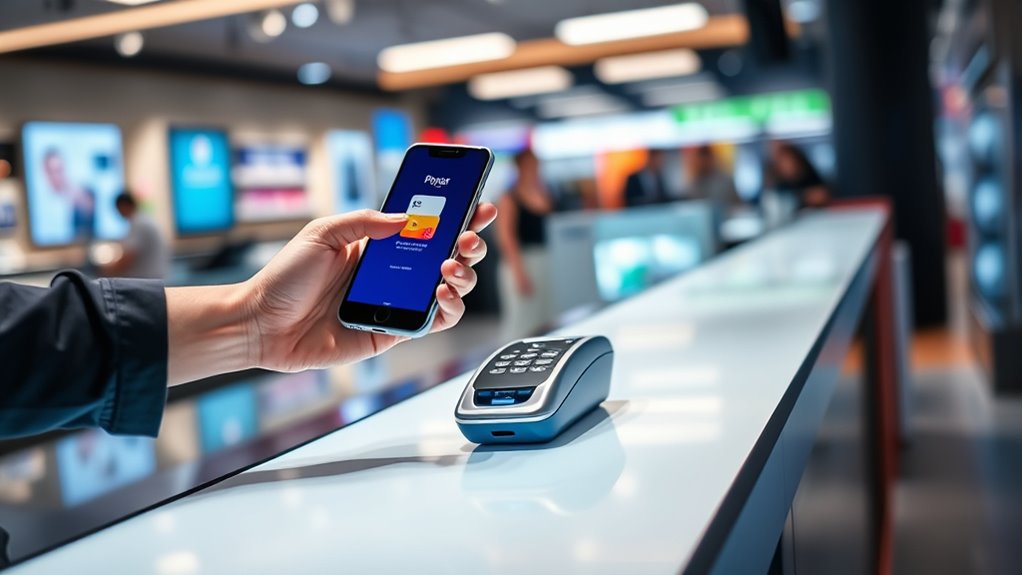Real-time payment processing lets your business send and receive funds instantly, boosting cash flow and customer satisfaction. It eliminates waits for payments to clear, so you can access funds faster and respond quickly to market demands. Digital wallets make transactions seamless and secure, but you need to guarantee your systems can handle the increased speed and security risks. Staying updated on these changes helps you leverage the full benefits—explore further to discover how to implement these innovations effectively.
Key Takeaways
- Real-time payment processing enables instant fund transfers, improving cash flow and operational efficiency for businesses.
- Digital wallets facilitate quick, secure transactions, enhancing customer experience and accelerating payment cycles.
- Advanced fraud detection tools and machine learning are critical to maintaining security in fast-paced payment environments.
- Integration requires infrastructure upgrades, staff training, and robust security measures to handle increased transaction speeds.
- Embracing real-time payments can differentiate businesses, boost customer loyalty, and position them competitively in digital commerce.

Have you ever wondered how money moves instantly between accounts today? The answer lies in real-time payment processing, a technology revolutionizing the way businesses and consumers handle transactions. Gone are the days of waiting hours or days for payments to clear. Instead, funds transfer within seconds, creating new opportunities for cash flow management and customer satisfaction. As a business owner, understanding how this system works can give you a significant edge in today’s fast-paced economy. Digital wallets play a pivotal role here, acting as convenient, secure platforms for making instant payments. They allow your customers to store payment information digitally, enabling quick transactions without the need to input card details repeatedly. This not only improves the customer experience but also accelerates the payment process, making your business more efficient. However, with increased speed and convenience come concerns about security. Fraud prevention becomes central to your strategy, especially when handling real-time transactions. Modern payment processors incorporate advanced fraud detection tools that monitor activity continuously, identify suspicious behavior, and block fraudulent attempts before they can cause harm. These systems use machine learning algorithms to analyze patterns and flag anomalies, giving you peace of mind that your transactions are secure. It’s important to partner with payment providers that prioritize fraud prevention, so you can minimize risks while offering rapid payment options. As digital wallets grow more popular, so do the tactics used by cybercriminals. That’s why investing in robust security measures is essential to protect your business and your customers’ sensitive data. Additionally, real-time payment processing can improve your operational efficiency by reducing the need for manual reconciliation and decreasing the days it takes to access funds. This immediacy helps you manage cash flow better, plan for expenses, and respond quickly to market demands. Customers now expect seamless, instant transactions, and if you can meet that expectation, you’ll build stronger customer loyalty and stand out from competitors still relying on traditional payment methods. Keep in mind that integrating real-time payment systems requires careful planning, ensuring your existing infrastructure can handle the increased transaction speed securely. Training staff and updating policies around fraud prevention are also critical to maintaining a safe, efficient environment. Embracing wall organization solutions can further optimize your space and streamline your operations. Ultimately, embracing real-time payment processing means transforming your business operations, enhancing customer satisfaction, and staying competitive in a digital world. By leveraging digital wallets and prioritizing fraud prevention, you’ll not only keep pace with technological advances but also foster trust and confidence in your brand. The future of payments is here, and those who adapt quickly will enjoy the advantages of faster, safer, and more convenient transactions.
Frequently Asked Questions
How Secure Are Real-Time Payment Systems?
Real-time payment systems are quite secure, especially with advanced fraud prevention measures and strong encryption standards. You can trust that transactions are protected from unauthorized access, as banks and payment providers continuously update their security protocols. However, you should also stay vigilant by monitoring your accounts and implementing additional security practices, like multi-factor authentication, to further safeguard your transactions and reduce the risk of fraud.
What Are the Cost Implications for Businesses?
You’ll find that cost implications for real-time payment processing involve various pricing structures, such as transaction-based fees or subscription models. Implementation costs may include integrating new systems and staff training, which can be upfront investments. However, these expenses often lead to faster payments and improved cash flow. Carefully compare providers’ pricing structures and consider long-term benefits to determine if real-time processing aligns with your business budget and goals.
How Do Real-Time Payments Impact Cash Flow?
Real-time payments act like a fast-moving river, boosting your cash flow with swift payment speed that keeps funds flowing smoothly. You’ll see money arrive instantly, reducing delays and improving liquidity. Plus, with robust fraud prevention, you can trust your cash stays secure even as the flow accelerates. This dynamic process helps you manage expenses better, capitalize on opportunities sooner, and keep your financial current steady and reliable.
Are There Industry-Specific Real-Time Payment Solutions?
Yes, industry-specific solutions exist to meet your sector’s needs. You can leverage sector-focused platforms designed for your industry, whether retail, healthcare, or logistics, ensuring seamless integration and compliance. These tailored solutions address unique transaction requirements, optimize cash flow, and enhance customer experience. By choosing industry-specific solutions, you gain tools that are better aligned with your business processes, helping you stay competitive and efficient in real-time payment processing.
What Are the Technical Requirements for Integration?
Think of integrating real-time payments as wiring your cash flow directly into a high-speed highway. You’ll need a robust API integration that allows seamless data exchange, ensuring data synchronization between your systems and payment platforms. This involves secure authentication, real-time data updates, and compatibility with existing infrastructure. By meeting these technical requirements, you keep your payment processes flowing smoothly, like traffic on a well-oiled expressway.
Conclusion
Embracing real-time payment processing gently opens doors to smoother transactions and happier customers. While it might seem like a small shift, it’s actually a quiet revolution that can elevate your business’s efficiency and reputation. By staying ahead of the curve, you’re not just keeping up—you’re subtly leading the way into a more seamless, connected future. So, consider this your gentle nudge toward adopting a system that works quietly, yet powerfully, behind the scenes.










